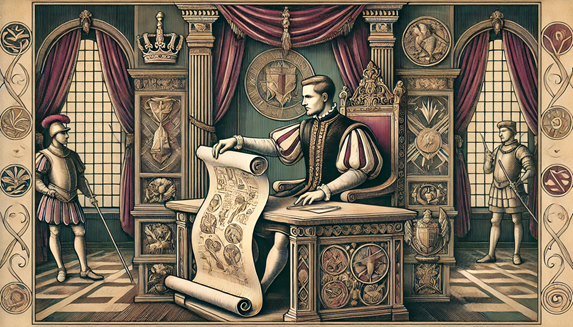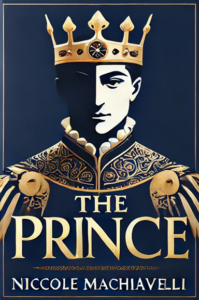SUMMARY
- The work categorises principalities into hereditary and new, highlighting the unique challenges faced by new rulers in gaining loyalty.
- Machiavelli emphasises the importance of adaptability in governance, tailoring strategies to the state’s and its citizens’ specific needs.
- The book advocates for a pragmatic approach to leadership, often endorsing morally ambiguous actions to maintain power and stability.
- A key theme is the balance between fear and love, suggesting that while being loved is ideal, being feared is more effective for control.
- The Prince’s unflinching realism and practical advice have made it a foundational text in modern political science, influencing leadership strategies for centuries.
REVIEW
The Prince by Niccolò Machiavelli is a seminal work of political philosophy, written in the early 16th century. It offers a pragmatic guide for rulers on acquiring and maintaining power and has profoundly influenced political thought and leadership strategies over the centuries.
The Prince thoroughly examines different principalities, focusing on the challenges and strategies associated with ruling them. Machiavelli categorises principalities into hereditary and new, highlighting the unique difficulties new rulers face in securing loyalty and stability. Through historical examples, he illustrates the importance of adaptability and strategic governance tailored to a state’s specific needs and its people.
The impact of The Prince lies in its unflinching realism and practical advice, which diverged from the idealistic views of governance prevalent at the time. Machiavelli’s emphasis on the effective exercise of power, often through morally ambiguous means, has sparked debate and reflection on the nature of leadership, making it a cornerstone of modern political science.
Machiavelli explores key concepts in The Prince, including the acquisition and maintenance of power, the role of fortune and virtue, and the necessity of pragmatism in leadership. He argues that rulers must be willing to act immorally when necessary to preserve their states, advocating for a flexible approach that prioritises results over ideals.
Another significant concept is the balance between fear and love in governance. Machiavelli suggests that while being loved is desirable, being feared is a more reliable way to maintain control. This controversial stance underscores the book’s focus on the harsh realities of political life and the problematic choices leaders must make to ensure their survival and success.
The Prince remains special due to its candid exploration of power dynamics and enduring relevance in political discourse. Machiavelli’s insights into human nature and governance continue to resonate, offering valuable lessons for leaders navigating the complexities of political authority.

CHARACTERS
Cesare Borgia: A prominent figure in the book, he is used as an example of a ruler who effectively consolidated power through cunning and ruthlessness.
Pope Alexander VI: The father of Cesare Borgia, he plays a significant role in the political landscape of Italy during his time, influencing Cesare’s rise.
Lorenzo de’ Medici: the ruler of Florence at the time Machiavelli wrote, is regarded as a model for effective leadership and governance.
Francesco Vettori: A friend of Machiavelli, he represented the intellectual and political circles of Florence, providing context for Machiavelli’s ideas.
Agathocles: A historical figure mentioned by Machiavelli, he is an example of a ruler who gained power through cruelty and treachery.
Moses: Referenced as a leader who successfully established a new order, illustrating the qualities of a great ruler.
Hannibal: A military leader cited for his strategic prowess, demonstrating the importance of military strength in maintaining power.
Scipio Africanus: Another historical figure, he is contrasted with Hannibal to highlight the differences in their leadership and military strategies.
The Prince: A conceptual character representing the ideal ruler, embodying the principles and strategies discussed throughout the treatise.
LOCATIONS
Florence: The birthplace of Machiavelli and a significant centre of political power during the Renaissance, Florence is known for its influential ruling families.
Rome: The capital of the Papal States and a major political and religious centre, often cited for its governance and power struggles.
Milan: A powerful duchy in Northern Italy, known for its military strength and political intrigue, is often cited as an example of effective rule.
Naples: A kingdom that faced various challenges in governance, illustrating the complexities of ruling diverse populations.
Venice: Renowned for its unique political system and maritime power, serving as a model of stability and wealth in governance.
Siena: A city-state that exemplified the struggles of smaller principalities against more significant powers, highlighting the importance of alliances.
Bologna: Known for its academic institutions and political significance, it represents the intersection of education and governance.
Turin: A city that played a role in the shifting political landscape of Italy, often referenced in discussions of power dynamics.
Genoa: A maritime republic that showcased the importance of trade and naval power in political strategy and influence.
The Papal States: A significant political entity governed by the Pope, illustrating the intertwining of religion and politics in governance. Modern location: Vatican City.
IMPROVES
- Creativity and Imagination: Reading Machiavelli can inspire innovative thinking and new ideas in various contexts.
- Analytical Thinking: The book encourages critical analysis of power dynamics and human behaviour.
- Leadership: Machiavelli’s insights on leadership can help one lead effectively in various situations.
- Emotional Intelligence: Understanding Machiavelli’s perspectives can improve one’s ability to navigate complex social interactions.
- Professional Development: The strategies discussed can be applied to advance one’s career and business acumen.
REFERENCES
- The Prince by Niccolo Machiavelli – Review by Fayyaz Ahmad
- The Leadership Ethics of Machiavelli’s Prince – Business Ethics Quarterly
- Machiavelli’s Prince: A New Reading – Notre Dame Philosophical Reviews
- The Prince by Machiavelli – Summary, Main Points & Analysis
- The Critique of Christianity in The Prince – Catherine Zuckert

